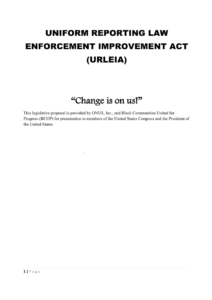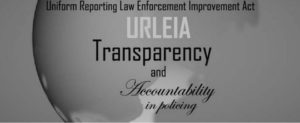
By Will Gains on March 26th, 2016
“Strip Law Enforcement of Unbridled Power”
With policing in our country spiraling out of control, radical changes are needed at the local, state and federal levels to improve the nation’s policing culture. The Uniform Reporting Law Enforcement Improvement Act (URLEIA) might be the radical change we need.
An important aspect of URLEIA is the introduction of a concept known as “smart policing.” Smart policing requires law enforcement agents to carryout policing functions with a focus on the obligation to preserve life and prevent injury. As such, law enforcement agents are expected to verify that an “actual threat” exists before using lethal force, even if it requires the officer to retreat or wait for backup. The act also increases the number of people who can investigate police wrongdoing by deputizing licensed attorneys throughout the United States to act on behalf of DOJ and bring criminal actions against police officers who violate citizens’ rights. The legislation offers a host of other important benefits: It holds law enforcement agents responsible for their misdeeds or reckless acts that can precipitate events that lead to a person’s death or injury; prohibits high-speed chases except in extraordinary circumstances; and introduces other changes designed to end the dysfunctional policing.
URLEIA also gives rise to a Pattern or Practice (POP) data bank that will track the individual actions of every law enforcement agent and private-duty security officer in the United States. In addition to allowing for the early detection of problematic officers and security guards, POP will provide detailed metrics and statistics about policing, including the number of people killed, demographic information about subjects of police actions and other important information needed to ensure transparency. The POP data bank also contains an unfit indicator that will prevent red-flagged police officers and security guards from continuing to work in law enforcement.
The act also introduces other important, but perhaps less obvious, protections, one of those being limiting the number of hours police officers can work on a given day in order to ensure officers are poised to exercise good judgement while interfacing with members of the public.
More manifestly obvious, however, it prevents local and state political bodies from using military equipment without first obtaining approval from the U.S. Department of Justice. It also includes whistleblower protection for law enforcement agents and requires law enforcement agents to disclose wrongdoings carried out by fellow officers. URLEIA also subjects officers to periodic drug and alcohol testing, particularly after a use-of-force event.
Equally important, URLEIA hands over the entire investigative process for an officer-involved use-of-force event to an independent investigative team selected by a member of the victim’s family. Law enforcement agents indicted for their acts will be prosecuted by a private prosecutor, also selected by the victim’s family. Furthermore, URLEIA provides for strong whistleblower protection that holds officers criminally liable for failing to disclose known wrongdoing by unscrupulous cops traditionally insulated from extensive legal ramifications for their actions by the collective “blue wall” of police silence and solidarity. Without question, URLEIA is the most sweeping legislative proposal developed to date to curtail out-of-control policing. Members of the public are encouraged to visit Change Is On Us to learn more about URLEIA.

GENERAL INTRODUCTION
The pattern or practice investigation is one of the primary tools used by the United States Department of Justice (DOJ) Civil Rights Division (Special Litigation Section) to discourage the use of unconstitutional policing practices such as racial profiling and excessive use of force.
At the onset of a pattern or practice investigation, DOJ gathers information about a law enforcement entity: It hosts meetings and listening sessions, reviews documented evidence, and gleans information from conversations and anecdotal accounts. DOJ’s preliminary investigations can and often do point to the need for an in-depth examination of a law enforcement agency’s interactions with the public.
On September 4, 2014, DOJ reported that it had opened more than 20 pattern or practice investigations within the last five years and during that time period had prosecuted more than 300 individual officers for misconduct. DOJ also reported it was overseeing 14 agreements with small and large law enforcement agencies to reform their law enforcement practices. DOJ reported that the agreements, which include changes meant to address bias in policing, have led to dramatic decreases in excessive use of force, more community-friendly policing, and greater equity in the delivery of police services.
Thus the aim of the Uniform Reporting Law Enforcement Improvement Act (URLEIA) is to create a national data bank that makes available ongoing pattern or practice data on every law enforcement agent and agency in the nation. URLEIA is a sensible and cost-effective method of ensuring that the patterns and practices of law enforcement agencies and agents nationwide are transparent and readily discernible. Once URLEIA is fully implemented, DOJ will seldom need to descend upon a law enforcement agency and sift through piles of records to determine if a pattern or practice investigation is warranted. Also, DOJ, management at law enforcement agencies, licensing bodies, civilian review boards, and oversight entities can use data bank metrics and reports to help detect unfit law enforcement agents before they do irreparable harm to members of the public.
Another aim of URLEIA is to alter the policing culture in the United States. Policing in America has reached an untenable state, especially as it pertains to African Americans. A pattern of failing to indict and convict law enforcement agents who kill unarmed African-American children, teens, adults and other citizens without cause, is contributing to national unrest. Read More Here